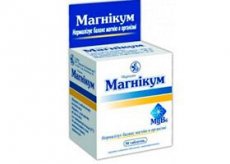Medical expert of the article
New publications
Preparations
Magnicum
Last reviewed: 03.07.2025

All iLive content is medically reviewed or fact checked to ensure as much factual accuracy as possible.
We have strict sourcing guidelines and only link to reputable media sites, academic research institutions and, whenever possible, medically peer reviewed studies. Note that the numbers in parentheses ([1], [2], etc.) are clickable links to these studies.
If you feel that any of our content is inaccurate, out-of-date, or otherwise questionable, please select it and press Ctrl + Enter.

Magnikum is a complex of vitamins and microelements (magnesium lactate dihydrate and pyridoxine hydrochloride) in one preparation.
Indications Magnicum
Indications for the use of Magnikum are the following conditions that appear due to a lack of magnesium necessary for the body:
- atherosclerosis, coronary heart disease;
- kidney stones;
- high blood pressure;
- chronic fatigue;
- depressive states;
- stress;
- psycho-physical overstrain;
- tearfulness;
- muscle pain;
- high loads;
- children during periods of rapid growth.
- Magnikum is recommended for use in combination therapy in individuals with the following diseases:
- hypertension;
- heart pathologies (arrhythmia, myocardial infarction)
- diabetes mellitus;
- osteoporosis.
Release form
Magnikum is released in the form of ellipsoid-shaped tablets, convex on both sides, white in color, in a protective film that dissolves in the intestines.
Film-coated tablets in blister packs. Quantity: ten tablets per blister. Packed in a cardboard box of five blisters.
 [ 4 ]
[ 4 ]
Pharmacodynamics
Magnesium is a powerful catalyst for enzymes involved in cardiac contraction and neuromuscular stimulation. It stabilizes platelets and fibrinogen. Magnikum helps to increase the amount of this element and stabilize metabolic reactions.
Vitamin B6 (pyridoxine hydrochloride) is one of the regulators of amino acid metabolism. Vitamin B6 corrects metabolic processes in the myocardium, being a cardioprotector, hepatoprotector, neuroprotector.
Pharmacokinetics
Two components - pyridoxine hydrochloride and magnesium are well combined and mutually complement each other's properties. Vitamin B6 improves the absorption of magnesium, and also accelerates its absorption by cells, increases its content in the blood and red blood cells, reducing its excretion in the urine.
Dosing and administration
Magnikum is taken orally. The tablets should be swallowed whole so as not to damage the tooth enamel with the components of the drug. The active ingredients of Magnikum are absorbed in the gastrointestinal tract quite quickly. When the required amount of magnesium has accumulated, it is necessary to stop taking the drug. It should be taken with a sufficient amount of drinking water (1 glass). The duration of therapy and the dose of Magnikum are prescribed by the doctor.
The usual regimen is as follows:
- Adults - 1-2 tablets three times a day.
- children over 6 years of age - 1 tablet 3 times a day.
If a patient has a calcium deficiency in addition to a magnesium deficiency, therapy should begin with compensating the magnesium level and then prescribing medications to normalize calcium.
Use Magnicum during pregnancy
It is not advisable to use Magnikum during pregnancy. There are not enough studies showing the effect of the drug on fetal development. The question of conducting therapy with this drug for expectant mothers is decided by the attending specialist, weighing the possible benefits and harm for the woman and the child. During breastfeeding, if the drug is prescribed, it is necessary to stop breastfeeding, since magnesium is transferred to the child with mother's milk.
Side effects Magnicum
Side effects of Magnikum are as follows:
- immune system – allergic reactions (if intolerant to any component);
- gastrointestinal tract - vomiting, diarrhea, epigastric pain;
If side effects occur, you should immediately consult a doctor who will adjust the therapeutic regimen for taking the drug.
Overdose
An overdose of Magnikum occurs when the doses prescribed by the doctor are exceeded, which may cause the following phenomena: vomiting, a sharp drop in blood pressure, tremors, pain in the limbs, difficulty breathing and cardiac arrhythmia. There is no specific antidote. If an overdose of Magnikum occurs, it is necessary to wash the stomach and prescribe enterosorbent drugs (not earlier than 1 hour after taking the last dose). In case of an overdose, symptomatic treatment is carried out. It is necessary to replenish the water-electrolyte balance and the degree of hydration.
Patients with severe renal failure undergo hemodialysis to eliminate hypermagnesemia.
Interactions with other drugs
Absorption of magnesium in the intestine is reduced when using drugs containing calcium and phosphates; absorption of tetracycline is reduced (it is recommended to observe a 3-hour interval between taking drugs); iron preparations are absorbed worse; the effectiveness of levodopa is weakened; when taken simultaneously with thrombolytic agents, the effectiveness of the latter is reduced.
Storage conditions
Magnikum is stored in the same way as other medicines in tablet form. It is necessary to protect the medicine from direct sunlight, temperature - 15-25 ° C, and also protect it from children.
Shelf life
The expiration date of Magnikum is indicated on the packaging. Under favorable conditions, it is stored for 2 years (24 months). The drug is not recommended for use after the expiration date.
Attention!
To simplify the perception of information, this instruction for use of the drug "Magnicum" translated and presented in a special form on the basis of the official instructions for medical use of the drug. Before use read the annotation that came directly to medicines.
Description provided for informational purposes and is not a guide to self-healing. The need for this drug, the purpose of the treatment regimen, methods and dose of the drug is determined solely by the attending physician. Self-medication is dangerous for your health.

